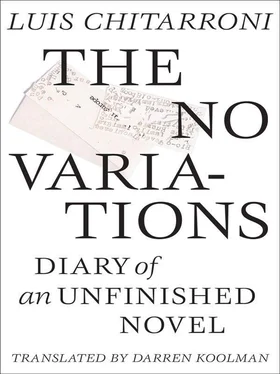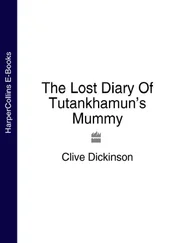Elena never went to those bars. She arrived one afternoon with an air of alarm and “irrepressible” indignation (exaggerated Lalo, who kept boasting until late, very late in the night, about his conquest) …
#20
It hurts to recall the journal’s degree of semantic instability during those years. As Urlihrt argued: it oscillated between epileptic absence and rigorous malapropism. The work Luini had to present as evidence before a tribunal, like the one in the stories ( go-betweeners, feticheurs , etc), was, according to Luini, a plagiarism larded with quotations, proportioned (although disproportionately) by Lalo Sabatani, Agraphia ’s warlock of black magic par excellence.
CEREMONIES / LITURGIES
On Elena’s way of cutting the uncut pages of a book
On Nicasio’s means of quitting smoking
On Eloísa’s way of opening a pack of cigarettes
On the state in which Nicasio leaves his writing desk
On Elena’s way of tucking away a keepsake
A few words on Elena’s way of underscoring.
In more than one sense, Elena’s underscores are perfect. First, there is the sense of their being painstakingly worked over — abusing at least two meanings of the Spanish word prolijidad —and there is their sense of harmless, innocent accomplishment. They concealed [conceal] both her general temperament and her mood in the [moment, act of] reading while, at the same time, they showed [show / exhibited / exhibit] her infallibility in distinguishing what’s important from what’s trivial, accessory, and most of all [most often], obvious. The method was unique. Inés employed it with neither violence nor moderation in every book of every genre she read — drama, poetry, narrative, essay — in the three languages she’d understood — English, French, Spanish — an exercise, which, at first glance, may have seemed evidence of a strict upbringing, a rhetorical tribute or stipend to her harsh [hard-going, traumatic] orphanhood.
Perusing her underscores leaves the reader in no doubt as to the expectations, intentions, or interests of the young poet, nor, incidentally, of her desire to become cultured — understandable in someone in pursuit of independent judgment — accumulating [accordingly] hints, indications, suggestions, and ritornelli for the enrichment of her conversation.
Monitoring the behavior of these designs on the page could lead us either to an alleyway or into an ocean in the manner they evince the capacity or skill of distributing patterns and concealing them, discouraging any search for symmetry — every indication of it being interrupted with astonishing frequency and irregularity by so many irrelevant, extraneous, and self-indulgent diversions.
#22
The trip was supposed to end in Athens, [but for some unknown reason] it ended in Treviso … With a bang, a whimper . Topics suggested [are]: an untimely confession, a lovers’ bedroom spat, not in view of the whole world [[Frost poem in Yvor Winters refers to Thoreau [in Blyth?], an inseparable accident ]]. It was difficult, at that point, to give credence to Elena’s love, [respond to that] affection or show of affection responsible for Nicasio’s affection or show of affection. It is possible Elena contrived a scheme of indiscernible grudges and surprise attacks similar to those woven into the first sestina. The mutual disloyalties are an apotheosized exaggeration of error and inaccuracy. For Elena and Nicasio, who never collaborated on anything or even wrote in the same room together, this style was captivating.
Oliverio Lester, The X-Positions
#23
Sestina of Departure
The Self from others always shies away
To taste the bitter bread of solitude
Boasts of knowing what it means to live
But blurs the trail, adulterates the prints
On that crudely-executed map of fate [: ]
Whose exploration amputates his shade .
(V. 1) The Sun at midday amputates our shade
I was gullible, inconstant as a shade .
Even what remains eventually goes away:
The farewell prose of destiny, of fate
The asymmetric rule of solitude ,
The foot’s unbroken contour in a print ,
And the rival act of truly being alive
#5 ISSUES
[ The ages / Connection. Dos. Nicasio .
Style á deux— writing in collaboration ]
1.
The Two Illnesses
[[#17]]
The two illnesses and the theory of the three endings and the decision on the title of the story taken from the collection of stories rejected by Belisario / Basilio in accordance with the narrative version in the plagiarized book —Accents?
There was a trend, in Agraphia , for taxonomy, for purblind classification. The writers, collaborators, had to— we had to — get inside familiar types. We decided on Elena and Nicasio. This was the idea: I would try to commit suicide within the first hour, i.e. of Hilarión’s departure, but would prove incompetent. Likewise, Nicasio. Not to mention Lino (Scacchi). But Lalo Sabatani referred to an earlier tradition, originating with Aldecoa Inauda, a poet of the Golden Age. Note: Gabriel Bocángel wrote of him: “Being acquainted with many styles / he imitated all.” That is, he had an illimitable repertoire … and during the Golden Age too! Or maybe it was a joke, a boutade by Bocángel. Aldecoa was famous for his ability to adapt, for his skill in accommodating himself to the court (careerism, we now call it). The “being acquainted with many styles” could very well be a reference to this aptitude, instead of an encomium on his reputation as an imitator. But he, favored by nature with her gifts and the court with its endowments, did his imitating in the open; whereas we did it behind a screen, deviously, unscrupulously, copying and imitating, as if there was a chip in our brains directing us to plagiarize. For this first classification, there were [added] long-term consequences. For example: those of us who adapted to Hilarión Curtis’s practice would have an easy life but a difficult death. Note that I have sanpaku eyes so I always believed I’d die by accident. Remo’s death was what convinced us. Some of us would die of cryptodermia. They, the others, the better ones, they would live out the rest of their lives having adapted to kleptolalia.
Basilio U., an oral confidence
2.
Felipe has grown too much. He’s become a lot like me. But I, on the other hand, have gotten younger, so I no longer look old enough to be his father: more like his older brother, according to Dos. So, [disregarding me] Dos gives the impression that Felipe only had a mother — despite his being fat enough to have been incorporated by several parents — and since Eiralis lacks both matter and memory, Felipe’s father is conceived as a mismatch of body and soul, or viceversa, the result being a kind of ghostly figure with an out-of-focus skeleton covered by a film of breath. As such, he talks like a ventriloquist. The most recent of such creations arrived without my noticing and without anyone telling me their ages at birth or how old they are now. It’s all a matter of perspective, in the space where chronologies are made but time is indiscernible, eloquent, but also cruel. Oliverio seems to mock him to Luini, who must be the one who warns the character of the joke as he ages more and more to resemble me. But the small age gap between Lester and Prosan remains the same and only becomes nil at Elena’s discretion. Hazlitt or Lamb spoke of the satellitic character of women; the kind who write the sort of servile, saturnine characters who in turn becomes the satellites of others.
Читать дальше












